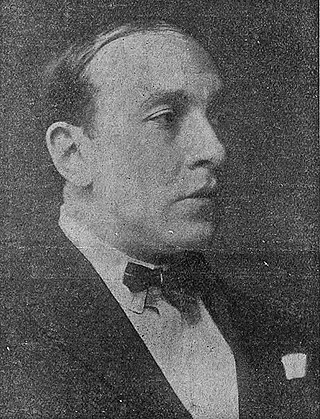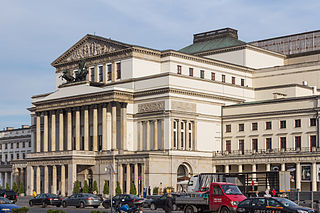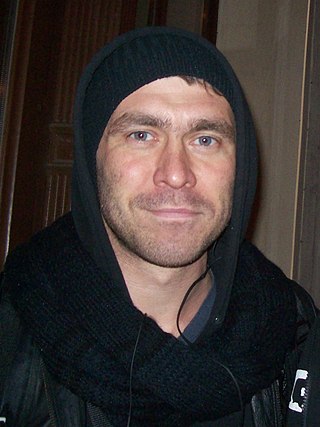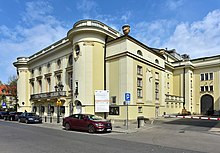
Leon Schiller or Leon Schiller de Schildenfeld was a Polish theatre and film director, as well as critic and theatre theoretician. He also wrote theatre and radio screenplays and composed music. He was born in Kraków under the Austrian rule during the foreign Partitions of Poland, to a family of Jewish and Austrian origin that had been ennobled by Empress Maria Theresa.

The National Theatre in Warsaw, Poland, was founded in 1765, during the Polish Enlightenment, by that country's monarch, Stanisław August Poniatowski. The theatre shares the Grand Theatre complex at the Theatre Square in Warsaw with another national venue, the Poland's National Opera.

The Saxon Garden is a 15.5–hectare public garden in central (Śródmieście) Warsaw, Poland, facing Piłsudski Square. It is the oldest public park in the city. Founded in the late 17th century, it was opened to the public in 1727 as one of the first publicly accessible parks in the world.

Irena Kwiatkowska was a popular Polish actress, known in Poland for her many cabaret roles and monologues, as well as appearances in movies and television shows.
Masovia Governorate was an administrative-territorial unit (guberniya) of Congress Poland of the Russian Empire, which existed from 1837 to 1844, with its capital in Warsaw.

The Ester Rachel and Ida Kaminska Jewish Theater is a state theatrical institution in Warsaw, Poland. It was named after the Polish-Jewish actress Ester Rachel Kamińska, who was called the "mother of Yiddish theater," and her daughter, the Academy Award-nominated actress Ida Kamińska. Ida Kamińska directed the theater and acted in its productions from the time of its founding until 1968.

Lidia Zamkow (1918–1982) was a Polish theatre actress and director.

Těšín Theatre is a theatre in the town of Český Těšín, Czech Republic.

Arnold Szyfman was a Polish theatre director and stage director of Jewish origin. Founder of the Polish Theatre in Warsaw. He supervised the construction of Teatr Polski in Warsaw which opened in 1913 with Zygmunt Krasiński's Irydion. One of the most beautiful playhouses in Europe, it was equipped with a revolving stage and up-to-date lighting, and was under Szyfman's management from 1913 to 1939, except for his two-year internment in Russia in the First World War. Following his hiding during the next war, In July 1945, he took up the position of director of the Polish Theater, stepping down from the position of director of the Theater Department at the Ministry of Culture and Art was fired by the communist authorities in 1949 and returned for a final time from 1955 to 1957. He was also the manager of other Warsaw theatres and companies. At the Polish Theatre, he employed the best artists and directed numerous productions himself, including 22 Shakespeare plays. He was involved in the restoration of the Grand Theatre building in Warsaw.

Kazimierz Dejmek was a Polish actor, theatre and film director, and politician. During his career he managed the New Theatre in Łódź, the National Theatre, Warsaw, and the Teatr Polski, Warsaw. From 1993 to 1996 he served as Poland's Minister of Culture. In 1984 Dejmek was awarded the Witkacy Prize - Critics' Circle Award and in 1989 the Grand Cross of the Order of Polonia Restituta, one of his country's highest honours.

The Polish National Ballet is the largest and most influential ballet company in Poland. It continues a ballet heritage, dating to the 17th century.

Anna Romantowska is a Polish film and theatre actress.
TR Warszawa is a theatre in Warsaw, Poland, by Marszałkowska Str., 8.
Jarosław Adam Kilian, born in Poland in 1962, is a Polish director for theatres, operas and TV, an art historian, and a pedagogue. He is the son of Polish designer Adam Kilian.
Henryk Baranowski was a Polish theatre, opera and film director, actor, stage designer, playwright, screenwriter and poet. He is best known for his starring role in the film Dekalog: One directed by Krzysztof Kieślowski, and also appeared as Rosa's brother Josef in Rosa Luxemburg directed by Margarethe von Trotta and as Napoleon in Pan Tadeusz directed by Andrzej Wajda. He directed over 60 theater and opera productions in Europe, Russia and the US and was the Artistic Director of the Teatr Śląski in Katowice in the mid 2000s. He also directed four "television theatre" productions: ...yes I will Yes, For Phaedra (1998), Saint Witch (2003), and Night is the Mother of Day (2004).

Marcin Czarnik is a Polish film and theatre actor, most notable for appearing as Feigenbaum in the Academy Award-winning film Son of Saul. Graduating from the Theatre Academy in Warsaw in 2000, he performed at the Polish Theatre in Wrocław from 2002 to 2004, and then again in 2006, and at the Wybrzeże Theatre in Gdańsk for a brief period from 2004 to 2005. In 2011, he was awarded the Medal for Merit to Culture – Gloria Artis.

The Polish Theatre in Poznań is a Polish repertory theatre founded in 1875. Is one of the oldest and best-known theatres in Poland.

The Theatre Museum in Warsaw is gathering collections related to the history of Polish and foreign theatres.

Adam Franciszek Józef Siedlecki or Adam Grzymała-Siedlecki (AGS) (1876–1967) was a Polish literary and theater critic, playwright, translator, prose writer and director.

Konrad Ksawery Swinarski was a Polish theatrical, television, film and opera director and stage designer.
















